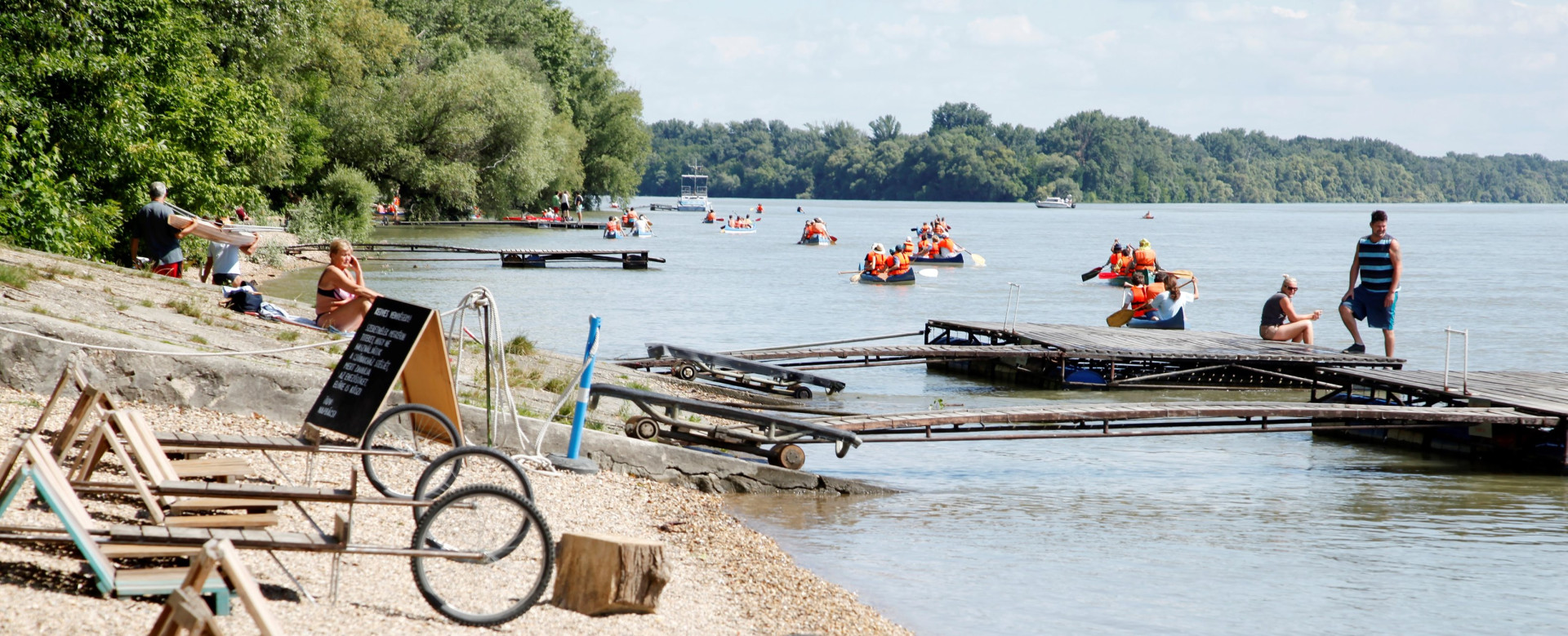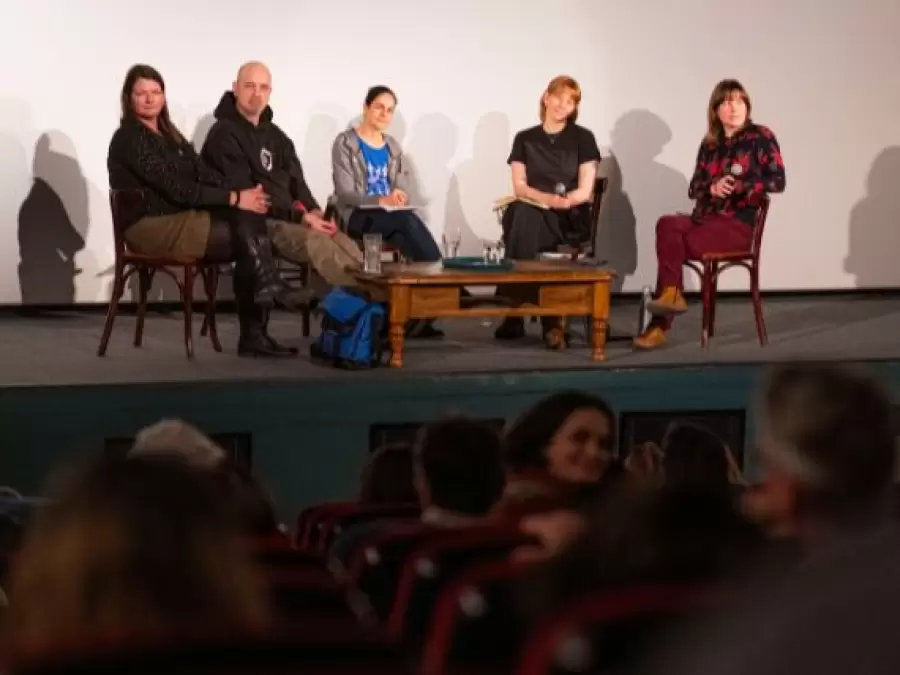During the Finnish Film Days, organised in February 2025, FinnAgora had the honour to host a panel discussion with representatives from five different environmental groups. The panel was inspired by and held after a screening of the documentary Once Upon a Time in a Forest (Havumetsän lapset, 2024 dir. Virpi Suutari), which tells a story of civil disobedience among young activists who try to save Finnish forests from logging and biodiversity loss. During the talk, the activists got to share their struggles for fair and sustainable environments, reflecting on each of their successes and setbacks in bringing sustainability issues to the forefront of public discussions.
Coming from both Helsinki and Budapest, the panelists included Meri Külm, an activist in the Finnish environmental movement, István Ferenczi, chair of Kiserdő Association, Kinga Orthmayr, an activist in Ligetvédők, and Éva Kalló, an organizing member of FÁK a Rómain. As moderator was Réka Pálinkási, active in the Auróra Climate Garden.
Below, the activists explain why their local work is crucial for climate safe futures and ensuring that nature can be a part of their communities’ everyday lives.
.jpg)
Ligetvédők – City Park Protectors
In March 2016, locals were shocked to see that huge, ancient trees were getting cut down in a popular beer garden in City Park, Europe’s oldest public park. Apart from the usual voices on Facebook expressing discontent, there were also people who actually went there: they broke through the gate locked by the construction team. Huge, monstrous buildings were being planned, and civilians protested this at demonstrations. We had also collected 10 000 signatures opposing the plans – but were graciously ignored by Fidesz politicians. One of the first protesters who stopped the loggers was Zoltán Illés, former Environmental Minister in the Fidesz government.
As the news spread, more and more people showed up in the former area of the "Kertem" ruin bar. This area became Ligetvédők's – the City Park Protectors' – camp for the next 3,5 months. We represented a heterogeneous crowd: locals including the old and the young, activists, hippies, and homeless persons who found a purpose, community and a place to stay. Many of us stayed at night in tents, others came during the day or took part in the various events: there were lots of concerts, workshops, presentations, meetings, yoga classes, etc. Greenpeace activists taught us about non-violent protest.
In July 2016, the ruling regime tried to completely eradicate the camp with help from the police. But they did not succeed – Ligetvédők kept the protest going. Besides us, numerous professional organisations, landscape experts, urbanists and environmentalists have been trying to call the government’s attention to the devastating effect of the construction on the environment. But they will not give up. So far, two huge buildings have been finished: the House of Hungarian Music and the Ethnography Museum, and there are controversial plans for a new National Gallery in the heart of the park – which would spell the end for it.
Although we had to leave the camp and the movement scattered, we kept a smaller camp until the 2018 elections in a different area of the park, and held various actions to slow down if not stop the construction, eg. by occupying machines. At the moment, our community has a large online community but is dormant. Still, there are no big constructions going on either. Our movement also served as an inspiration to numerous green movements, such as “10 million trees” and “Kiserdővédők”.
Many questions remain: Will they really start constructing the gallery here? If yes, will the locals respond as fiercely as in 2016? In our experience, people do care if their local nature is in danger, and if they know what they themselves can do to protect their communities.
– Kinga Orthmayr
Elokapina – Extinction Rebellion Finland & Metsäliike – Forest Movement
Elokapina is the Finnish branch of the global Extinction Rebellion movement and has been active since late 2018. Elokapina demands that the national government takes climate science seriously, prioritises climate action in all decision-making and commits to a just transition. Metsäliike is a Finnish grass-roots movement demanding a stop to the biodiversity loss in the Finnish and Sápmi forests, and has been active for the last few years. To exemplify the problematic conditions: more than 800 of Finnish forest species are endangered, as are 76% of habitats, and only 6% of Finnish forest land is under permanent protection.
Both movements are active across the country and fight for a habitable planet and a more just future. Anyone who commits to the goals and guiding principles is welcome to join the movements, both have regular trainings for new-comers.
In the film Once Upon a Time in a Forest, the activists are participating in demonstrations and civil disobedience actions as a part of both Elokapina and Metsäliike.
– Meri Külm.jpg)
Auróra Climate Garden
The Auróra Climate Garden is an eco-forestry project in the heart of the 8th district. In the last 5 years, we’ve created a food forest from a gravel parking lot which is self-sufficient and self-sustaining. With only city waste and volunteer work, our focus on soil building has evolved along with the succession of our space from natural wasteland to emerging forest.
From the start, compost was the dynamo of our garden system. It has turbo-charged growth of the plants and seeds we put in, and of the trees which volunteered from the mulch we put down. Most of our 180 trees germinated from seeds in the garden waste bags that we cover our soil with through winter. We offer local composting for kitchen, garden and other urban waste. Promoting nature-based solutions, we hope to inspire people to view small local interventions as a way to make their city climate proof.
Our project also endeavors to nurture and build a collective of city people who can take care of the environment. We organize tours and workshops for school groups, university students, NGOs and corporate teams. Our programs are most effective when we can present hands-on learning, so people feel they too have participated in our project, and in a solution.
– Réka Pálinkási
Kiserdővédők – Protectors of the Little Woods
Kiserdővédők formed as a local campaign against the development of a four lane road in the place of a 22 hectar woodland that connects two of the most livable neghbourhoods in Budapest: Wekerletelep and József Attila Lakótelep.
Instead of becoming a local NIMBY group, we deliberately took the bigger picture and argued against motorised traffic in general, and the nature and placement of the proposed New Danube Bridge, that the four lanes would serve and connect.
We fought in court against the environmental permit that the bridge development got, and won, alongside the City of Budapest, who also debated the permit.
We are now in a time of “peace”, as there are no funds, nor permits or will from the government to push the project. We will concentrate on nurturing, ecologically developing and enjoying our Little Woods, while keeping in mind that the project might be reignited practically any time.
– István Ferenczi

FÁK a Rómain – Trees at Római
The FÁK a Rómain group has been operating for more than 10 years because of an environmentally damaging flood protection development. We wanted to save our 3 kilometers long natural riverbank from the Municipality and several real estate interests. The Municipality had ordered the construction of a huge mobile dam along the river, which would have involved cutting down 1500 trees and changed the whole riverbank.
Our main goal was to stop this development and keep the line of defence at its current place along the Nánási-Királyok road. We organised big demonstrations with more than 1-2000 people, held professional forums, collected more than 20 000 signatures, and we have a local newspaper. Finally, the elections in 2018 saved us and the banks of Római, when the new green politicians changed the direction of the project: they wanted to preserve the natural riverbank and develop the dam at the road.
After the elections we have changed our strategy – instead of fighting we have started to focus on community programs such as tree planting, garbage collection, community rowing and other green or sport programs. One of our big achievements was saving the trees and a community planning process has started, where we were able to influence the future of this area. We worked a lot for a free public urban beach, we organised “test beach days”, urban guerilla beaches, and we measured the water quality continuously. Finally, a few years ago, Budapest’s first riverside beach opened there officially, managed by the Municipality.
Our team and our community programs are open to anyone who wants to deal with green issues in the III. district, or just wants to understand and do something in connection with the process of tree care, waste management or composting.
– Éva Kalló
.jpg)
Text: Cecilia Fewster

